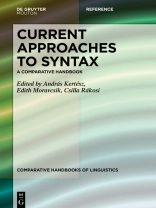Even though the range of phenomena syntactic theories intend to account for is basically the same, the large number of current approaches to syntax shows how differently these phenomena can be interpreted, described, and explained. The goal of the volume is to probe into the question of how exactly these frameworks differ and what if anything they have in common.
Descriptions of a sample of current approaches to syntax are presented by their major practitioners (Part I) followed by their metatheoretical underpinnings (Part II). Given that the goal is to facilitate a systematic comparison among the approaches, a checklist of issues was given to the contributors to address. The main headings are Data, Goals, Descriptive Tools, and Criteria for Evaluation. The chapters are structured uniformly allowing an item-by-item survey across the frameworks. The introduction lays out the parameters along which syntactic frameworks must be the same and how they may differ and a final paper draws some conclusions about similarities and differences.
The volume is of interest to descriptive linguists, theoreticians of grammar, philosophers of science, and studies of the cognitive science of science.
Yazar hakkında
András Kertész, Debrecen, Hungary;
Edith Moravcsik, Milwaukee, WI, USA;
Csilla Rákosi, Debrecen, Hungary.












